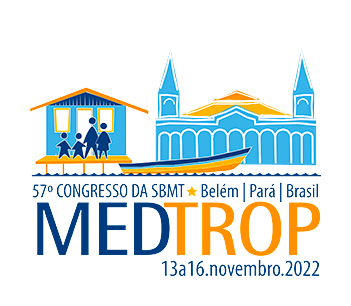Dados do Trabalho
Título
ILLEGAL MINING INCREASES MALARIA TRANSMISSION IN INDIGENOUS AREAS OF RORAIMA
Introdução
Endemic malaria is present in all 15 municipalities of Roraima state, Brazilian Amazon. Knowledge of epidemiological data of specific populations can guide health policies to formulate effective strategies for integrated control of health-disease care.
Objetivo(s)
This study aims to know when, where and who fell ill with malaria in Roraima state from 2010 to 2020.
Material e Métodos
This descriptive study was based on secondary data through the analysis of numbers of cases (SIVEP-Malaria / Epidemiological Surveillance Information System), hospitalizations (SIH / Hospitalization Information System) and deaths (SIM / Mortality Information System).
Resultados e Conclusão
During this period, 113,326 malaria autochthonous cases, 3,409 hospitalizations, and 54 deaths were reported. The IPA and the hospitalizations showed significant changes over the period, but without significantly affecting the number of deaths. The increase of P. falciparum infections was significant throughout the study but did not influence the hospitalizations and deaths. Cases imported from Venezuela had increased significantly since 2016 and those with the transmission in rural, urban, and settlement areas have decreased between 2010 and 2014. However, malaria prevalence in indigenous and mining areas has been increasing since 2014. The way space is changed in mining open, where mining wells produce a multitude of breeding sites, added to the behavior of miners who work with little clothes at times with greater vector activity and the presence of asymptomatic individuals, contribute to the high incidence of malaria in mining sites. In addition, miners’ mobility promotes the renewal of the susceptible population due to the constant entry and exit of infected or not infected people. We concluded that the presence of miners in Yanomami indigenous areas is a reality that has been contributing to malaria increase in Roraima. In this way, the need to implement health policies that also meet this contingent is reinforced, and it is necessary to include other government bodies in the discussion on mining in indigenous lands, which, like any other economic activity, must take into account the principles of sustainability, preservation of biodiversity and guaranteeing the cultural and social rights of indigenous peoples to ensure the social well-being and health of indigenous and non-indigenous populations.
Palavras-chave
Brazilian Amazon, Mining, Malaria, Roraima, Indigenous.
Área
Eixo 06 | Protozooses
Categoria
NÃO desejo concorrer ao Prêmio Jovem Pesquisador
Autores
Jacqueline de Aguiar Barros, Fabiana Fabiana Granja, Pedro Pequeno, Paola Marchesini, Maria de Fátima Ferreira da Cruz, M F
